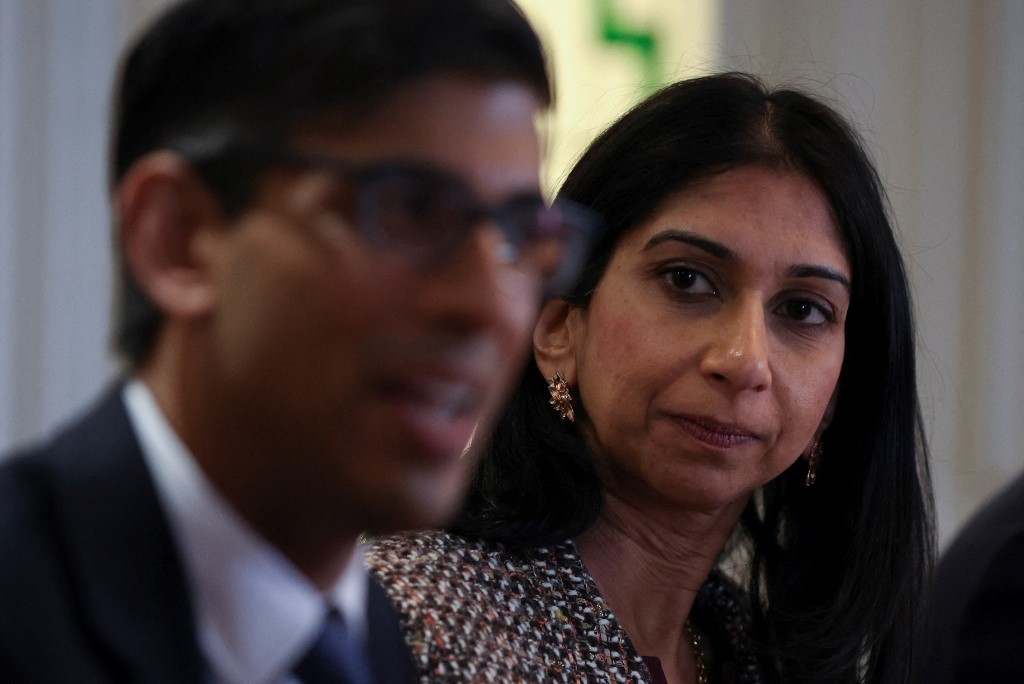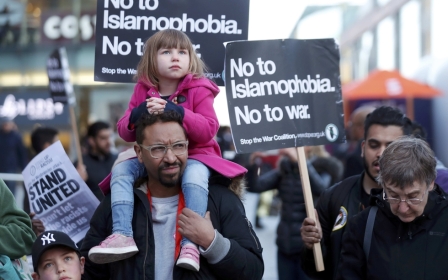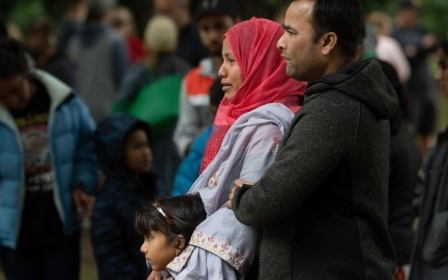UK: Braverman's posturing on 'Muslim grooming gangs' is top-level gaslighting

It’s been a grim week for British politics, dominated by crass posturing over "grooming gangs". The willingness to treat victims and survivors of child sexual abuse as political footballs shows a crushing lack of care. The racism on display has been unabashed. The solutions proposed have been painfully disconnected from actual needs.
Ahead of upcoming local elections and quite possibly to detract from the country’s woes, it began with Home Secretary Suella Braverman’s exclusive in the Daily Mail. Announcing new policies on "grooming gangs", she insisted that such perpetrators are "almost all British-Pakistani" and their victims "overwhelmingly white girls".
Prime Minister Rishi Sunak then further reinforced the myth that addressing child sexual abuse requires a narrow lens on (white) girls abused by Pakistani-heritage men.
The fixation on grooming gangs is nothing new. We have had over a decade of intensively racialised and misinformative discourse in the UK, fuelled by many self-interested actors.
The latest announcements fuel everyday racism and further empower the far-right, which seeks to conflate minorities and migrants with rapists. Innocent people have already lost their lives in attacks linked to this discourse, including in Rotherham and Finsbury Park
New MEE newsletter: Jerusalem Dispatch
Sign up to get the latest insights and analysis on Israel-Palestine, alongside Turkey Unpacked and other MEE newsletters
Braverman’s intervention signalled that the government was now prepared not only to suppress its own evidence when politically inconvenient, but openly to deny it. It felt like gaslighting at the highest level.
That key evidence is the Home Office’s 2020 so-called grooming gangs report, the findings of which then-Home Secretary Priti Patel called "disappointing". In brief, it concluded that most such offenders are white men, that there isn’t any generalisable evidence of racial disproportionality, and that victims come from varied backgrounds - including boys and ethnic minority children.
Braverman doubled down, insisting 'it’s not racist to tell the truth'. But her claims are both racist and untrue
Braverman doubled down, insisting "it’s not racist to tell the truth". But her claims are both racist and untrue. They promote an extremely narrow and partial view of child sexual abuse that contradicts the wider evidence base, including so many credible testimonies from those with professional and/or lived experience.
Warnings followed from leading experts across professions: child sexual abusers "come from all parts of our society", children are "by far, most likely to suffer sexual abuse within the family", and narrow profiling risks creating "blindspots" for intervention. The manufactured invisibility of boys and minority ethnicity victims is particularly damaging given the additional barriers they face in accessing support and protection.
Confected culture war
When Sunak, Braverman and the ill-informed commentariat focus their blame on "political correctness", they are using children as fodder in a confected culture war. The political correctness frame is tired and unconvincing.
It’s also highly implausible that Asian/Muslim offenders got preferential leniency, given what we know about institutional racism in policing and far-reaching problems in responses to rape and child sexual abuse.
In a few places (eg Telford and Rotherham), fears of upsetting race relations were indeed identified as a problem. But even there, "political correctness" has never been the sole or even the main explanatory factor for inaction. Focusing on that detracts from major issues, such as derisory attitudes to victims and survivors of child sexual abuse - who were all too often ignored, blamed and even criminalised.
Although children are thankfully no longer prosecuted as "child prostitutes", adult survivors are still fighting to clear historic criminal records. The links between child sexual exploitation and youth offending are still neglected. Despite statutory changes, children still risk criminalisation for offences committed while exploited in criminal activity (eg drug dealing).
Blaming political correctness is politically convenient. It detracts from the "brutal cuts" of austerity that have systematically underfunded key services that are crucial in tackling abuse and supporting victims and survivors. It gives incompetent professionals an easy excuse for inaction, while insulting the many caring and competent people who try desperately hard amid ever-dwindling resources.
Braverman and Sunak will, of course, be well aware of the complex realities of child sexual abuse: its enormous scale, the varied contexts in which it occurs, and the diversity of victims and offenders alike.
They will know singling out "grooming gangs" further whips up a racialised moral panic around select abusers only. They will have been briefed on better ways to improve responses. They just don’t care.
When challenged, Sunak and Braverman repeatedly emphasised certain high-profile locations - such as Rotherham, Rochdale and Telford - where many Pakistani-heritage child sex offenders were convicted. That doesn’t prove disproportionality, simply that those offenders are real - which should never be in dispute.
Just days after their race-baiting assertions, two very telling cases hit the news. Thirteen men were charged in Bolton with what ITV called "serious child grooming sex offences". Twenty one offenders were convicted in West Midlands Police’s "largest-ever child sex abuse case", including eight women. Both groups would seem obvious candidates for the term grooming gang - except they were white, and white offenders don’t typically seem to attract this label.
Selective outrage
When Sunak announces action on the supposedly "specific issue" of grooming gangs, it is received by many as a call to focus on racialised offenders. It is a deliberate political choice to deploy the problematic term "grooming gangs", despite it being contested, having no meaningful definition or clear boundaries, and actively racialising abuse.
The Home Office itself acknowledged these issues back in 2020, but the government has long since ignored their warnings.
The government’s new measures are wildly detached from what is most needed and unlikely to deliver real change
I know many of the stereotypical grooming gang cases in the north and Midlands well from my own research. I cannot stress enough how horrendous these cases were, and how much the victims achieved in bringing at least some of these abusers to justice.
There is no argument for ignoring such offenders. It is just the selective outrage, misleading claims and outright racial profiling that needs to stop.
There is a lot of talk of professional failings, and rightly so. What sometimes gets forgotten, however, is how many fiercely dedicated professionals have also fought tirelessly alongside victims and survivors. Together, they have genuinely transformed how the authorities respond to complex cases involving extra-familial abuse and group-based offending.
There is still much more to be done. But the government’s new measures are wildly detached from what is most needed and unlikely to deliver real change. Many others have argued similarly, drawing on both professional and/or lived experience.
Grotesque move
Politicians across the board have an opportunity to improve the standard of political debate and enable better responses to child sexual abuse.
When interviewed, opposition leader Keir Starmer acknowledged "that the vast majority of sexual abuse cases do not involve those of ethnic minorities" and called for more honesty.
But he also repeatedly pandered to the language of grooming gangs, and didn’t issue a strong corrective on the claims around political correctness.
Soon after, a new Labour Party campaign poster was released, which sparked a well-justified backlash. It showed Sunak, alongside the slogan "Do you think adults convicted of sexually assaulting children should go to prison? Rishi Sunak doesn’t."
Implying that the UK’s first Asian prime minister is a friend of child molesters is a grotesque move. We don’t need any more performative politics or tough-on-crime posturing here.
It is time to stop treating child sexual abuse as a problem to be exploited, and work instead towards real solutions. We need a genuine commitment from across the political spectrum to inclusive, well-evidenced and properly funded responses.
That should include substantial investment in support services and in prevention, to avert more harms before they are done.
We also need a regular national prevalence survey so as to target interventions more effectively.
And we need to put victims and survivors - in all their diversity - at the heart of responses, not weaponise their trauma for political gain.
The views expressed in this article belong to the author and do not necessarily reflect the editorial policy of Middle East Eye.
Middle East Eye delivers independent and unrivalled coverage and analysis of the Middle East, North Africa and beyond. To learn more about republishing this content and the associated fees, please fill out this form. More about MEE can be found here.





